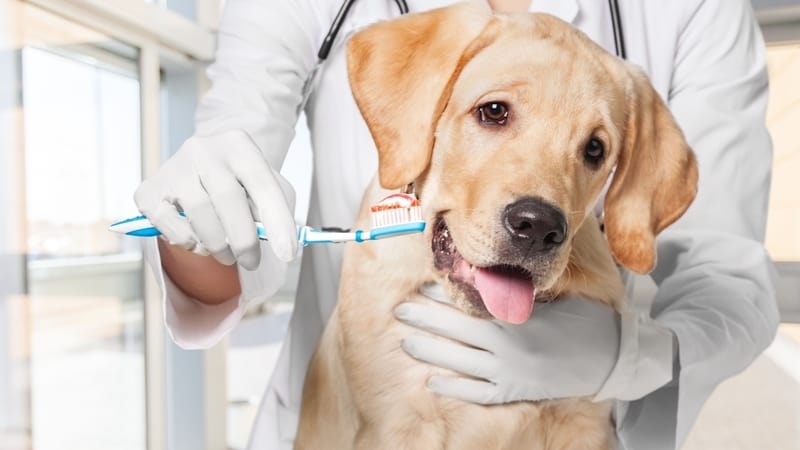4 Ways to Keep Your Pet Smiling
Advice from Dr. Lauren Pastewka in honor of Pet Dental Health Month

Proper dental care is a vital aspect of a pet’s overall health, and an important part of being a responsible pet owner. Dental disease is common in dogs and has serious implications if left untreated throughout a pet’s life. Dental related problems can range from painful tooth root abscesses to kidney, liver, and heart disease. With February being National Pet Dental Health Month, here are four things pet parents can do throughout the year to keep their pet healthy and smiling:
1. Brush your pet’s teeth
Frequent brushing is a great way to help prevent the formation of any dental diseases and can potentially reduce the number of visits to the veterinarian your pet may need. Daily brushing removes dental plaque and reduces the buildup of tartar over time. Your pet might surprise you and enjoy having their teeth brushed. A child’s toothbrush will work for smaller dogs, while a regular human toothbrush will work for cleaning larger dog’s teeth.
When brushing your pet’s teeth, remember to avoid using human toothpaste as some of the ingredients can upset their stomachs and be dangerous for them to consume. Pet toothpaste comes in flavors like chicken and peanut butter, which may be more appetizing. In addition to brushing, there are also mouthwash-like products for pets that can help reduce the bacteria in their mouth and freshen their breath.
2. Invest in pet dental health products
Many pet food companies have dental treats or chews for pets that can aid in improving dental health. Dental chews come in different shapes and sizes to allow pets to chew easily and encourage blood flow throughout the gums. Chewing allows dogs to clean their teeth themselves, even gnawing on a toy or treat can scrape off plaque. When choosing these products, be sure to inspect the label for the Veterinary Oral Health Council’s Seal of Acceptance. There are a few companies that make pet food specifically for helping improve a pet’s dental and oral health. Be sure to speak with your veterinarian about any new products, foods or treats you are considering giving your pet.
3. Recognize signs of dental disease
Dental disease affects not only your pet’s teeth, but their gums, mouth, and jaw as well. Detecting any oral issues early on can save pets from experiencing painful symptoms. Even when pet parents take steps to ensure their pet’s teeth and gums stay healthy, there is still a chance the pet will develop dental disease. Signs and symptoms of dental disease include: broken or discolored teeth, swelling around the mouth, inability to chew, refusal to eat, or bleeding from the mouth. Schedule an appointment with your veterinarian for an oral examination if your pet is displaying one or more of these symptoms.
4. Visit your veterinarian regularly
Your veterinarian will examine your pets’ teeth as part of their semi-annual examinations. It’s important to remember that the majority of dental disease lies below the gum line and may not be obvious during visual inspection alone. For this reason, your veterinarian may recommend annual cleanings and use special equipment, such as dental radiographs, to further investigate tooth roots and jaw structures. This process is similar to an annual human dental examination and cleaning, but does require the use of anesthesia in dogs and cats. While anesthetized, your veterinarian can safely clean where toothbrushes can’t reach to remove plaque and tartar that can be damaging to your pet’s health, as well as identify any areas of concern such as tooth root abscesses, loose teeth and inspect the oral cavity for irregular growths or masses.
Properly taking care of your pet’s dental and oral health will help them to live a longer, happier, and healthier life to keep you both smiling.
Dr. Lauren Pastewka is Chief Veterinary Officer of NewDay Veterinary Care at Pet Paradise. Pet Paradise is a comprehensive pet health care provider of overnight boarding, resort-style day camp, professional grooming and NewDay Veterinary Care. Dr. Pastewka leads 30 NewDay Veterinary Care clinics and teams, conveniently located in Pet Paradise resorts nationwide. For more information, visit petparadise.com.
Browse more Boomer pet-related articles in Pet World articles by Cathy M. Rosenthal


